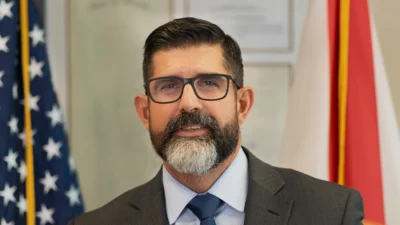Providence United Methodist Church issued the following announcement on March 11.
A loving United Methodist community came together two years ago to assemble a list of those whose homes were ravaged by Hurricane Irma with no means to repair the damage. Then, it got to work.
Hundreds of home repairs later, the hurricane relief effort throughout much of the state is winding down. Finances are drying up, and volunteers have scattered to other areas of the country that also experienced nature’s wrath.
Much work remains, though. The volunteers and staff are scurrying to finish as many cases as possible before their April and October deadlines.
And lest anyone forget, the next hurricane season begins June 1.
Most recently, the Central Florida team helped get a retired Baptist minister in his 80s back into his Winter Haven home after two years.
“It was himself, his daughter, and two other relatives living there. We had to replace flooring, kitchen cabinets, there were some plumbing issues, we had to replace the roof, and there was significant mold in the house. They have not been living in the home for two years.”
Similar stories often are repeated throughout the affected regions.
“I don’t know where people would be if it weren’t for this long-term disaster recovery the Methodists do,” said Tim DuBois, Tampa Bay team leader for Florida Restores. “We would have people with no other places to turn and would live in their damaged homes, praying there would be somebody to help them.”
His group still has 23 open cases. It’s a sobering reminder of how much time, money, and effort goes into helping people recover. Unfortunately, resources only stretch so far.
“The bottom line is we are demobilizing and will be closing the Irma project by the end of October, probably,” said Pam Garrison, who heads the effort in Collier and Monroe Counties, the hardest-hit areas.
The remainder of the state will shut down operations in April.
All urge their fellow Methodists to contribute to UMCOR, the United Methodist Committee on Relief, which played a significant role in funding the repairs. Florida Restores also received grants and partnered with the Mennonites, The Brethren, the Salvation Army, and other nonprofits to pay for fixes and do the actual labor.
Florida Restores has replaced or rebuilt 406 homes across 15 Florida counties. About three years’ worth of work remains in Collier and Monroe counties, but some will not be completed due to a lack of funding.
“It is a social justice issue to help these folks,” Garrison said. “I encourage folks to continue to give to UMCOR. We can’t be there if people aren’t providing resources.”
Florida Restores works with other agencies, but many of them face challenges as well. The Salvation Army is out of resources, and the Red Cross shut down some time ago. FEMA (Federal Emergency Management Agency) also is shutting down its case management program.
Garrison said she still has 603 approved cases for which Florida Restores hopes to acquire the necessary resources before the end of the year.
“That is the work we feel like we can accomplish. That is more than we have done to date, but that is typical. In the beginning, you are helping clients establish what their needs are, and resources are,” she said.
“As you get closer to the end of the recovery, it is more about funding and the teams to do the work.”
“The thing about the Mennonites is that they are so skilled,” team leader Trish Martin said. “Many of the houses at the end are more complex cases. A lot of those, we are now buzzing right through those.”
Martin’s group is now closing two cases every two weeks. One such case involved the home of a mom and teen daughter, which is nearly complete.
“Their situation was another extreme one; however, they remained in the home because they had nowhere else to go,” Martin said. “It’s in Auburndale. There were roofing issues and damage inside the home. We replaced the roof with UMCOR and partnered with the Salvation Army to help offset the cost.”
Recently her group had a home dedication after repairs were complete, with volunteers from Canada, Pennsylvania, Indiana, Alabama, and Michigan.
“One thing I always think about as I’m driving around is that living in the state of Florida; we get it cleaned up pretty quick to attract tourists. But if you don’t go into locations where tourists don’t visit, you don’t see blue weathered tarps that have been up for two years or experience the smell in some of these damaged houses,” Martin said.
“We are running out of money, and that prevents us from continuing this recovery. It breaks my heart because there are so many who still need help.”
Still, what they have been able to accomplish has been significant.
“We’ve been able to accomplish quite a bit. We hit our groove,” DuBois said. “We built the team for the state, and none of us knew what we were doing at the time, but it has all fallen into place.
“Obtaining clients and then moving them through the vetting process, finding the funding for them, and being able to schedule their work through contractors and volunteer teams has gone well. We use the volunteers to help cut costs, which means we can help more people.”
There is a concern, however, as this year’s hurricane season approaches.
“If another major hurricane comes, given where we are as a church, everything we are doing takes resources,” Martin said.
“Volunteer Florida has provided, but UMCOR has provided the lion’s share. If we don’t have the resources, I have no idea what we will do. As a church, we will respond, but the question will be, how do we get involved in the long-term recovery.”
Original source can be found here.


 Alerts Sign-up
Alerts Sign-up